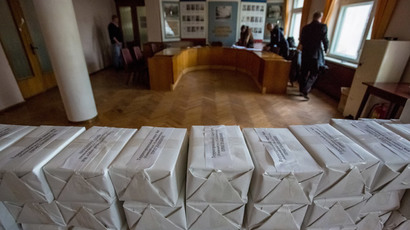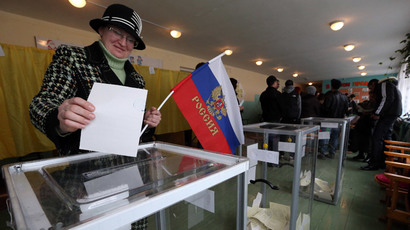Crimean ‘referendum at gunpoint’ is a myth – intl observers
The referendum on Crimea’s status is going peacefully, with record-breaking turnout, international observers report. Most of them told RT that the referendum is credible and the vote of the Crimean people should be respected.
No violations at the Crimea referendum have been reported by the international observers currently present in the republic.
“It’s all quiet so far,” Mateus Piskorkski, the leader of the European observers’ mission and Polish MP told Itar-Tass. “Our observers have not registered any violations of voting rules.”
Another observer, Ewald Stadler, member of the European Parliament, dispelled the “referendum at gunpoint” myth, by saying he felt people were free to make their choice.
“I haven’t seen anything even resembling pressure,” he said. “People themselves want to have their say.”
Many were impressed by the turnout, which appeared to be so high as to have people stand in lines to get to the ballot box in the morning. The turnout for the referendum in Crimea at 17.00 local time (15.00 GMT) was 70 per cent, the referendum’s website said.
"The lines are very long, the turnout is big indeed,” a member of the international observer mission, Bulgarian parliament member Pavel Chernev, said. "Organization and procedures are 100 percent in line with the European standards," he added.
135 international observers have arrived from 23 countries, including Austria, Belgium, Bulgaria, France, Germany, Hungary, Italy, Latvia and Poland, Crimean authorities said. Among those monitoring the referendum are members of the EU and national European parliaments, international law experts and human rights activists.

‘The referendum is legitimate’
Hours before the referendum started, RT managed to speak to some of those who decided to see for themselves, who’s ballots were going to be cast.
Quite contrary to the mainstream official approach taken by the EU and the US, most of them said they believed the referendum in Crimea was legitimate.
“The US and also the EU, they only respect international law, if it’s in favor of their opinion,” Johann Gudenus, member of the city parliament of Vienna, said. “Our opinion is – if people want to decide their future, they should have the right to do that and the international community should respect that. There is a goal of people in Crimea to vote about their own future. Of course, Kiev is not happy about that, but still they have to accept and to respect the vote of people in Crimea”.
Johannes Hübner, an Austrian MP said he felt he had to come to Crimea to get the real picture of what was happening on the peninsula.
“The view we get from the American and European media is very distorted,” he said. “You get no objective information. So we decided to come here to have a look at what’s really going on and see if this referendum is credible”.
Aymeric Chauprade political scientist and geopolitician from France believes the referendum is justified by Russian and Ukrainian history.
“Yes, I think the referendum is legitimate,” he said. “We are talking about long-term history. We are talking about the Russian people, about the territories of the former USSR with artificial borders. So, I think it’s a legitimate referendum that will give opportunity for this Russian population’s reunification with Russia”.
Tatjana Ždanoka, European parliament MP, representing Latvia, says the fact that the EU and the US refuse to see the referendum as legitimate can only be explained by double standard applied by Western leaders to the situation.
“The European parliament’s resolution demands that Crimeans comply with the Ukrainian constitution and says that the referendum is against that constitution. But that’s the same as to demand Kosovars to comply with the constitution of the former Yugoslavia, which naturally never happened. Double standards are everywhere in global politics. We know it from history. We see it now”.

A French geopolitical analyst and Marine Le Pen's foreign affairs senior advisor, Aymeric Chauprade, who also was an observer at the Crimea referendum, told RT it was impossible to say the vote was illegal as it had a “double legitimacy.”
“Of course it is a legal vote, because we are talking about real men and women who are Russian in their heart, in their history,” Chauprade said, talking about a “historical legitimacy.” But there was also an obvious political legitimacy, he added, “because we are talking about a democratic choice, and we’re talking about democratic parliament.”
Observers from Serbia also praised the referendum as free and legitimate.
“People freely expressed their will in the most democratic way, wherever we were,” Serbian observer Milenko Baborats told Itar-Tass. “We were amazed by the amount of people who came to the polls. After just 1 hour of voting in most of the polls we visited around 15 percent of voters already cast their votes.”
“During the day we didn’t see a single serious violation of legitimacy of the process,” he added.
According to another Serbian observer they visited eight polling stations in Simferopol, Alushta and Yalta.
“We spoke to the members of the electoral commission and the people who came to participate in the referendum. The voting process was very well organized,” Zoran Radoychich told Itar-Tass. “We did not notice any pressure on voters – that was our general impression.”
“As compared to Kosovo, where the referendum was indeed held under the pressure of Western nations, here people are voting freely.”
The foreign affairs editor from Chronicles Magazine, Srdja Trifkovic, who is also an observer at the Crimean referendum has told RT that he drove from Simferopol to Yalta on Saturday and back and he “didn’t see a single barrel (of a gun) unless you count two speed traps, one on the way out and one on the way back where policemen had guns.”
“The presence of troops on the streets is virtually non-existent and the only thing resembling any such thing is the unarmed middle-aged Cossacks who are positioned outside the parliament building in Simferopol. But if you look at the people both at the voting stations and in the streets, like on Yalta’s sea front yesterday afternoon, frankly I think you would feel more tense in south Chicago or in New York’s Harlem than anywhere round here,” he said.
Trifkovic added that in regard to referendums the western powers function on the basis of situational morality and “not on any firm principle.”
“In 1991 Croatia and Slovenia held illegal referenda to secede from Yugoslavia and by the end of that year the European Union recognized them as independent states. In February of 1992 Bosnia Herzegovina held a referendum in violation of its own constitution and yet in April of that year the US rushed to recognize Bosnia, which still remains an incoherent semi state as we know. And the succession of Kosovo from Serbia has been enthusiastically supported by the United States and its west European partners. And the right to self-determination was upheld ahead of the right of a state to territorial integrity. Well, what is source for the Kosovan goose will certainly prove to be the sauce for the Crimean gander but the United States and Brussels are yet to come to terms with it.”














